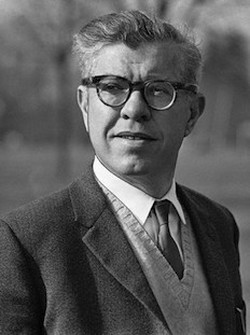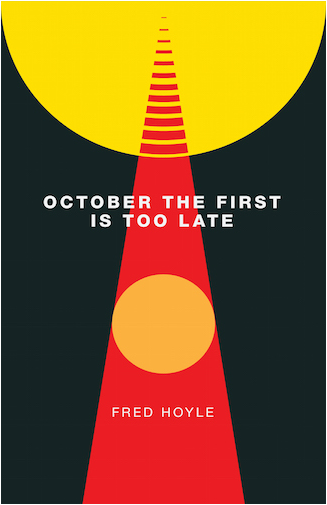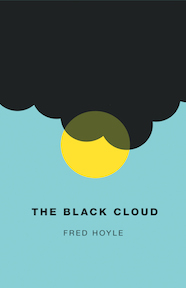|
BOOK DETAILS
Trade paper ISBN-13: 978-1943910106 List Price: $16.99 U.S. Pages: 178 Published: 2015 |
October the First is Too Late (1966)
Fred Hoyle Due to copyright restrictions, this title is only available to customers in the U.S. and Canada.
Orders from addresses outside of the U.S. and Canada will be cancelled and refunded. Credit card processing fees of 5% are non-refundable on all cancellations. Any questions, please ask *before* ordering. Book Description
Renowned scientist John Sinclair and his old school friend Richard, a celebrated composer, are enjoying a climbing expedition in the Scottish Highlands when Sinclair disappears without a trace for thirteen hours. When he resurfaces with no explanation for his disappearance, he has undergone an uncanny alteration: a birthmark on his back has vanished. But stranger events are yet to come: things are normal enough in Britain, but in France it's 1917 and World War I is raging, Greece is in the Golden Age of Pericles, America seems to have reverted to the 18th century, and Russia and China are thousands of years in the future. Against this macabre backdrop of coexisting time spheres, the two young men risk their lives to unravel the truth. But truth is in the mind of the beholder, and who is to say which of these timelines is the 'real' one? In October the First Is Too Late (1966), world-famous astrophysicist Sir Fred Hoyle (1915-2001) explores fascinating concepts of time and consciousness in the form of a thrilling science fiction adventure that ranks among his very best. |
reviews
‘Fred Hoyle is the John Buchan of science fiction. His fantasies are not only rooted in scientific possibility but are told at a galloping pace.’ - Julian Jebb, Sunday Times
‘Fine storytelling.’ - Kirkus Reviews
‘Fine storytelling.’ - Kirkus Reviews
ALSO AVAILABLE THROUGH ONLINE RETAILERS
MORE TITLES BY THIS AUTHOR
AUTHOR BIOGRAPHY

Fred Hoyle was born at Bingley, Yorkshire in 1915 and educated at Bingley Grammar School and Emmanuel College, Cambridge. A Fellow of St. John’s College, Cambridge, he was a lecturer in mathematics from 1945 to 1958, when he was appointed to the prestigious post of Plumian Professor of Astronomy and Experimental Philosophy. He became the founding director of the Institute of Theoretical Astronomy at Cambridge in 1967 and was knighted in 1972. He also held a position as a visiting professor of astrophysics at the California Institute of Technology.
Internationally famous as a scientist, Hoyle is remembered today as the foremost proponent of the steady-state theory of the universe and for his pioneering work in the field of stellar nucleosynthesis. An extremely original thinker, Hoyle was not afraid to advance controversial ideas, many of which were later proved correct. In the 1950s, when his paper on interstellar molecules was rejected for publication, he rewrote his ideas as a novel, The Black Cloud (1957). This book was a popular success and has remained in print continuously in Great Britain; its success paved the way for a number of other science fiction works, often co-authored by Hoyle with his son Geoffrey.
Several of Hoyle’s works, including Ossian’s Ride (1960), A for Andromeda (1962), Fifth Planet (1963), and October the First is Too Late (1966), have gone on to be recognized as classics of the genre. Hoyle was also well known for his nonfiction writings, which aimed at making science accessible to popular audiences and young readers, and for his BBC radio broadcasts and television work. He died in 2001.
Internationally famous as a scientist, Hoyle is remembered today as the foremost proponent of the steady-state theory of the universe and for his pioneering work in the field of stellar nucleosynthesis. An extremely original thinker, Hoyle was not afraid to advance controversial ideas, many of which were later proved correct. In the 1950s, when his paper on interstellar molecules was rejected for publication, he rewrote his ideas as a novel, The Black Cloud (1957). This book was a popular success and has remained in print continuously in Great Britain; its success paved the way for a number of other science fiction works, often co-authored by Hoyle with his son Geoffrey.
Several of Hoyle’s works, including Ossian’s Ride (1960), A for Andromeda (1962), Fifth Planet (1963), and October the First is Too Late (1966), have gone on to be recognized as classics of the genre. Hoyle was also well known for his nonfiction writings, which aimed at making science accessible to popular audiences and young readers, and for his BBC radio broadcasts and television work. He died in 2001.


